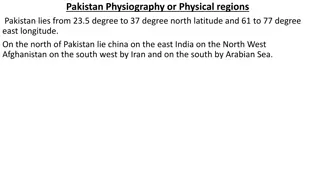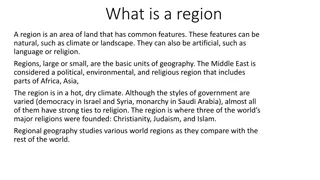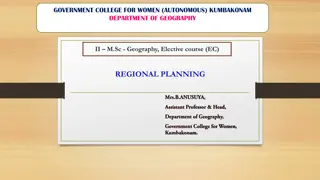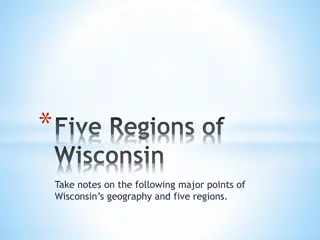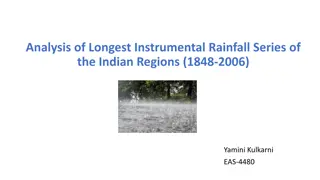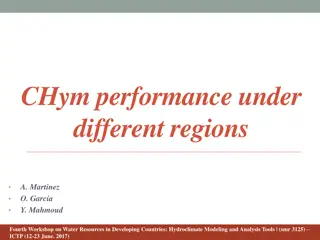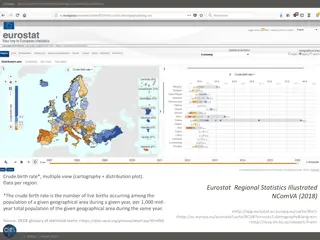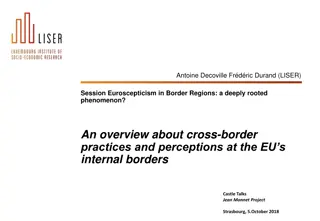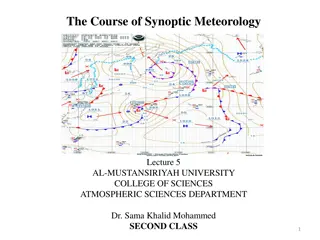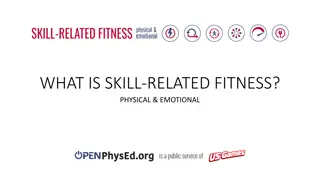Physical Distribution
Physical distribution is a critical aspect of business operations involving the planning, implementation, and control of the flow of goods from origin to consumer. Philip Kotler and William J. Stanton have defined physical distribution as a process of managing the movement of goods to meet consumer
0 views • 8 slides
Exploring the Meaning and Definitions of Physical Education
Physical education involves systematic training and instruction related to physical activities for the development and maintenance of the human body. It encompasses the growth of physical power, the cultivation of physical skills, and overall enhancement of physical well-being. Various definitions h
9 views • 7 slides
Importance of Fitness Testing in Physical Education
Health-related physical activity (HRPA) stresses the need to view fitness testing as a tool to promote increased physical activity levels rather than an end goal. The focus in school physical education is on equipping youth with the knowledge and skills for lifelong health. Fitness test protocols sh
0 views • 17 slides
Exploring Georgia's Diverse Geography and Physical Features
Georgia's geography is characterized by its unique physical features, including mountains to the north and the largest swamp in North America to the south. This state boasts a varied landscape comprising five distinct geographic regions: Blue Ridge Mountains, Valley and Ridge, Appalachian Plateau, P
0 views • 50 slides
Understanding Pharmaceutical Degradation: Types and Factors
Pharmaceutical degradation refers to the process of a formulation in a specific container losing its chemical, microbiological, therapeutic, physical, and toxicological specifications. It can be categorized into physical, chemical, and microbiological degradation. Physical degradation alters the dru
1 views • 50 slides
Climate and Climatic Regions of Pakistan
Pakistan exhibits diverse climatic regions ranging from sub-tropical continental mountains to arid desert plateaus. Factors like altitude, latitude, and distance from the sea greatly influence the country's climate. The country experiences weather conditions such as temperature variations, rainfall
0 views • 14 slides
Physiography and Physical Regions of Pakistan
Pakistan's physiography spans diverse physical regions, including mountains, plains, plateaus, and deserts. The country is bordered by China, India, Afghanistan, Iran, and the Arabian Sea. Key mountain ranges include the Himalayas, Karakoram Mountains, and the Hindu Kush. Pakistan's total area is 79
1 views • 13 slides
Understanding Regions in Geography
Regions in geography are defined by common features such as climate, landscape, language, or religion. They serve as basic units of geography, with the Middle East being a notable example encompassing political, environmental, and religious characteristics. Regions can be classified based on physica
0 views • 10 slides
Understanding Regional Planning and Economic Regions in Geography
Regional planning involves defining regional units, planning regions, and economic regions to ensure sustainable development. It focuses on creating suitable areas for population and employment distribution. The characteristics of planning regions include resource homogeneity, internal coherence, an
0 views • 16 slides
Population Resource Regions and Zelinsky's Classification
Geographers have long studied the relationship between population growth and resource adequacy, leading to the concept of Population Resource Regions (PRR) by W. Zelinsky. Zelinsky identified five types of PRR based on population-resource ratios, ranging from Type A with high resource utilization po
0 views • 8 slides
Population Distribution in Different Regions of Pakistan
The population distribution in Pakistan varies significantly among different regions, with certain provinces like Punjab and Sindh having higher population densities compared to Baluchistan and FATA. The rural areas are also categorized into different population density regions based on the number o
0 views • 14 slides
A Comparative Overview of World Cultural Regions
Explore the various types of cultural regions and their characteristics around the world, including North America, Latin America, the Middle East, Sub-Saharan Africa, and Europe. Discover how these regions differ in terms of language, religious beliefs, customs, and art forms, providing insight into
1 views • 22 slides
Geography and Five Regions of Wisconsin: Key Points and Natural Features
Wisconsin's geography is influenced by the Great Lakes and the Mississippi River, affecting population distribution based on topography, soil, and climate. The state's historical reliance on soil resources for fur trade, lumber, farming, and manufacturing is evident. Varied regions like the Driftles
3 views • 9 slides
EU Coal Regions Exchange: Pitch Presentation Guidelines for Matchmaking Session
In the upcoming matchmaking session on December 10th, 2021, representatives from EU coal regions will have the opportunity to pitch their ideas for potential exchanges and engage in discussions. Participants are required to prepare a formal pitch slide by December 6th, stick to a strict 90-second ti
0 views • 4 slides
Research Work for Physical Activity Statistics in the Czech Republic
The Czech Republic excels in measures of well-being but faces challenges in income and wealth distribution. Research in physical activity statistics focuses on various aspects like strength, speed, mobility, and mental well-being. Initiatives include assessing energy expenditure from basic activitie
1 views • 23 slides
Comparison of Convective Cores in Gulf and Plains Regions
A detailed comparison of convective cores between Gulf and Plains regions across different seasons reveals interesting patterns. Gulf storms have more cores in the fall, with larger sizes and more cores in winter. The Plains see more cores in the spring season and have generally bigger storms year-r
1 views • 4 slides
Euroscepticism in Border Regions: The Identity Crisis of Europe
Euroscepticism in border regions reflects frustration, disillusionment, and disengagement with the European idea at the borders of the EU. The identity crisis of Europe is showcased through sentiments of dissatisfaction and detachment towards the EU, as evidenced in various border regions. This phen
0 views • 29 slides
Understanding Physical Fitness and its Components
Physical fitness encompasses health-related and skill-related components that contribute to overall well-being. Health-related fitness includes muscular strength, endurance, cardiorespiratory endurance, flexibility, and body composition. On the other hand, skill-related fitness comprises speed, agil
0 views • 22 slides
Analysis of Longest Instrumental Rainfall Series in Indian Regions
This study by Yamini Kulkarni analyzes the longest instrumental rainfall series in Indian regions from 1848 to 2006. It includes the development of rainfall series for different zones using a network of rain gauge stations and statistical methods to understand fluctuations in precipitation over a 15
0 views • 9 slides
Analysis of CHyM Model Performance in Different Regions
The study evaluates the performance of the CHyM model in humid and arid regions, specifically focusing on Tropical South America and Central America. Through analyzing simulated values, seasonal behavior, and response to ENSO phases, the study provides insights into water resource management in thes
0 views • 16 slides
Enhancing Region Search Queries with Content and Spatial Similarity Measures
This project focuses on developing a system to provide top-k similar regions on a map based on user-specified query regions. By incorporating content and spatial similarity measures, the algorithm aims to accurately retrieve regions with similar shapes, scales, and representative categories. Challen
0 views • 12 slides
Reimagining Physical Education: A Holistic Approach at St. Peter's Girls Prep School
In the context of St. Peter's Girls Prep School, the philosophy around physical education is explored, emphasizing the integral role it plays in a child's holistic development beyond just playing sports. The approach focuses on instilling healthy habits, balanced nutrition, and physical fitness alon
0 views • 18 slides
The Impact of Artists and Creatives in Border Regions on Culture and Economy
Artists and creatives play a crucial role in the cultural and economic landscape, particularly in border regions where diverse cultures intersect, fostering creativity and innovation. Despite facing challenges, they significantly contribute to social cohesion, the European economy, and the cultural
1 views • 21 slides
Understanding Medical Records: History, Physical Examination, and Abbreviations
Medical records play a crucial role in documenting a patient's medical history and findings from physical examinations. The history and physical (H&P) document includes subjective information from the patient and objective observations by the examiner. The history (Hx) record covers personal medical
0 views • 20 slides
Visualization of Crude Birth Rates in European Regions
Explore the visualization of crude birth rates in different European regions using cartography and distribution plots. The data, sourced from Eurostat Regional Statistics, illustrates variations across regions, with France showing both the lowest and highest rates relative to other European countrie
0 views • 4 slides
Understanding Ionospheric Absorption Laws and Regions
The principles of the ionosphere at middle and low latitudes, Lambert-Beer exponential absorption law, and characteristics of E and F regions are discussed. The absorption of solar radiation, recombination reactions in different regions, and ionization processes are highlighted, providing insights i
0 views • 15 slides
Collaborative College Regions Mapping Tool for Educational Improvement
Explore the collaborative efforts between various colleges and regions in Scotland through this comprehensive mapping tool. Gain insights into partnerships, initiatives, and regions working together for educational improvement. Visualize the connections and collaborations enhancing the educational l
0 views • 7 slides
Biologically Important Evening Element in Promoter Regions: Insights from Research by Leila Shokat
The research explores the significance of the Evening Element as a motif in gene promoter regions regulated by CCA1. Understanding the importance of motif positions in promoters reveals insights into gene regulation and biological relevance. The study highlights the relevance of consistent motif pos
0 views • 6 slides
Euroscepticism in Border Regions: A Deep Dive into Cross-Border Practices and Perceptions
Explore the phenomenon of Euroscepticism in border regions, delving into cross-border practices and perceptions at the EU's internal borders. This study sheds light on how border regions emerge both functionally and institutionally, emphasizing the importance of understanding Euroscepticism in these
0 views • 16 slides
The Behavior of Spotless Active Regions During Solar Minimum
In this work presented at the SPAnet Workshop on Radio Astronomy in 2017, the study analyzed the physical parameters of spotless active regions observed during the solar minimum period from 2007 to 2010. Radio maps at 17 GHz from the Nobeyama Radioheliograph and magnetograms from the Michelson Doppl
0 views • 14 slides
Importance of Physical Education in Education Code and Policies
Revised Board Policy 6142.7 and related documents highlight the significance of physical education in schools, emphasizing its role in improving physical fitness, developing motor skills, and supporting overall student well-being. The Education Code outlines requirements, exemptions, and instruction
0 views • 12 slides
Overview of ERCOT Renewable Regions and Zone Map
ERCOT, managed by Bill Blevins, divides into seven solar and wind regions including North, South, East, West, Panhandle, Coast, and Houston. This division aids operations planning and management. The Renewable Regions Map and Zone Map play key roles in GIS status reporting and meeting presentations,
0 views • 4 slides
Understanding Air Masses in Synoptic Meteorology
Air masses are large bodies of air with uniform temperature and moisture conditions, influencing weather patterns across vast regions. Source regions play a key role in determining the characteristics of air masses, with factors such as stability of atmospheric circulation and surface properties sha
1 views • 17 slides
Review of MEPAG Report on Mars Special Regions Committee
The MEPAG Report on Mars Special Regions Committee was established by joint requests from ESA, ESF, and NASA to review planetary protection requirements for Mars. The Academies and ESF play a crucial role in providing independent scientific advice. The Joint Committee comprises experts from various
0 views • 14 slides
Understanding the Difference Between Exercise and Physical Activity
In this informative content, Professor Sandy Jack explains the distinction between physical activity and exercise. Physical activity involves any movement requiring energy, while exercise is intentional, structured movement aimed at improving or maintaining physical fitness. The evidence supports th
0 views • 12 slides
Colonial Life in the Mid-Atlantic and Southern Regions
Explore the intricate details of colonial life in the Mid-Atlantic and Southern regions during the early periods of American history. Discover the geographical landscapes, religious practices, social structures, political systems, economic activities, and community arrangements that shaped the daily
0 views • 19 slides
Understanding the Importance of Physical Education and Exercise Science
Explore the contemporary scope of physical education & sport, emphasizing the importance of personal philosophy in this field. Discover goals for physical educators, challenges in promoting physical activity, and the expansion of physical education beyond traditional settings. Understand the impact
0 views • 12 slides
Understanding TEN Testing in Cochlear Implant Candidacy
Discover the significance of Threshold Equalizing Noise (TEN) testing in evaluating cochlear implant candidacy for patients with potential dead regions in the auditory system. Learn about dead regions, absolute threshold levels, diagnosis using TEN test, interpretation of results, and step-by-step g
0 views • 17 slides
Understanding Skill-Related Fitness: Physical and Emotional Aspects
Skill-related fitness encompasses both physical and emotional components, such as agility, balance, coordination, power, reaction time, and speed. Physical agility involves quick body movements, while emotional agility relates to positive responses in various situations. Physical balance requires we
0 views • 7 slides
Anatomical Terminology Practice Exam: Body Regions and Landmarks
Test your knowledge of anatomical terminology by identifying various body regions and landmarks in this interactive practice exam. Practice naming cranial, cervical, thoracic, pubic, pectoral, axillary, brachial, and antecubital regions with the help of visual aids. Improve your understanding of ana
0 views • 32 slides






